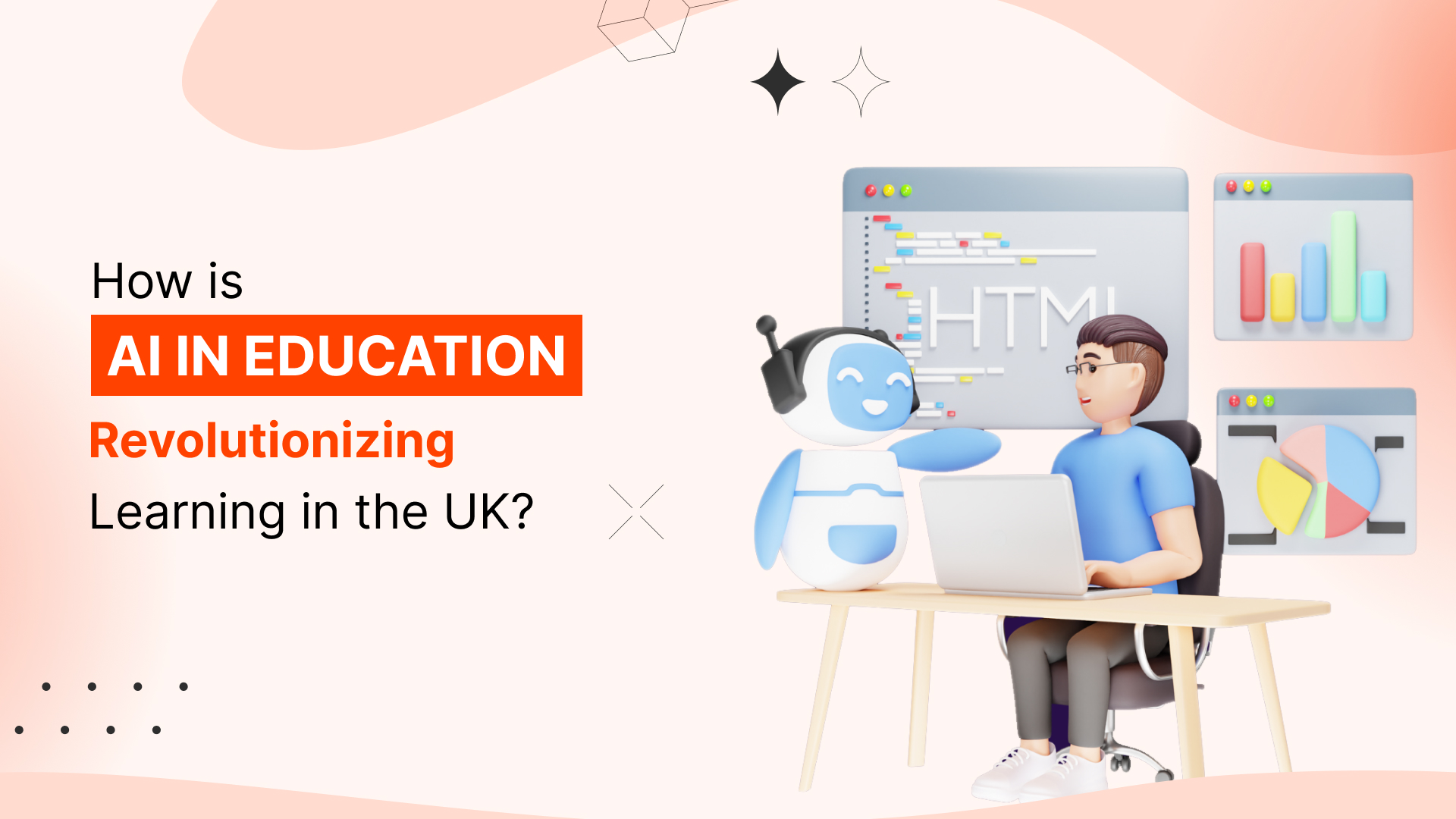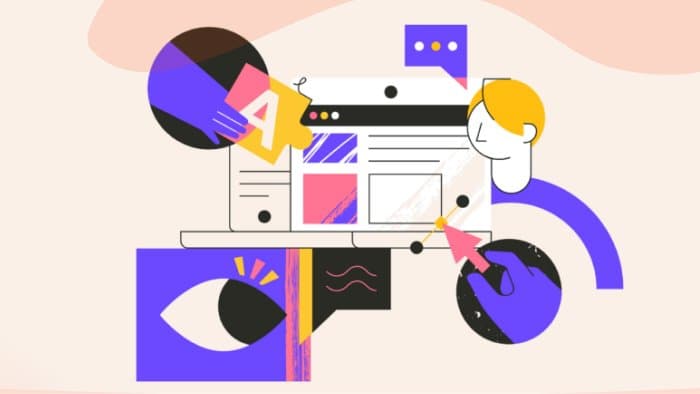How is AI in Education Revolutionizing Learning in the UK?

With technology rushing towards a more futuristic world, the need for a better education system in the UK has never been more critical. If managed well, emerging technologies – particularly AI in education – offer a number of opportunities to help traditional learning systems enable Education 4.0, a futuristic teaching and educational approach that provides students with the skills, abilities, and attitudes fit for the future.
With artificial Intelligence entering the education sector, Education 4.0 is no longer a dream project but a new reality. For people new to the term, let us explain that Education 4.0 is a detailed learning framework developed by education experts, policy-makers, practitioners, and business leaders to transform traditional primary and secondary education for the future. AI in the education sector has made it possible by eliminating all the risks and challenges that come along.
The AI’s application in education holds immersing potential for enhancing personalized learning experiences and streamlining administrative processes. While many see this technology as the replacement for teachers, it’s not as it is here to improve, not to replace. By automating the routine tasks of educators, AI helps them focus on the needs of an individual student, build relationships, and foster innovation. So, if you’re still in doubt about how AI in education would help the sector, we suggest you read this blog till the end to get answers to all your questions.
Key Stats Showcasing the Role of AI in Education
- The global AI in education market size was worth $4 billion in 2022 and is expected to increase at a CAGR of 10% to reach $8.57 billion in 2030. (Source: Global Market Insights)
- Approximately 47.3% of students at Cambridge use AI chatbots to complete their requirements for the degree. (Source: All About AI)
- Around 50% of educators are using AI for lesson planning. (Source: All About AI)
- The uses of AI in education include research (44%), summarizing information (38%), and generating tests and assignments (37%). (Source: All About AI)
- 44% of teachers use AI education systems in the classroom for research. (Source: All About AI)
- 43% of college students in the UK use AI tools like ChatGPT and report it being better than traditional tutoring. (Source: All About AI)
The Role of AI in the UK’s Education Sector
The expansion of AI in the UK’s education sector is both extensive and transformative. AI technology promises to transform traditional educational systems, creating more personalized, inclusive, and adaptive learning experiences for students and educators alike. The technology is set to create customized learning pathways tailored to each student’s unique needs, learning styles, and abilities. This ensures that students receive the necessary support and resources to thrive, regardless of their background or skill level.
In the UK, AI assists educators in identifying knowledge gaps among students and providing targeted feedback to enhance learning outcomes. AI-powered chatbots and virtual assistants offer immediate support and assistance to students outside the classroom, keeping them engaged and motivated. Additionally, AI enables educators to identify struggling students early on and deliver targeted interventions to help them succeed.
The technology has the potential to transform learning methodologies, shifting away from traditional classroom models towards more dynamic and interactive approaches. For instance, AI-powered virtual and augmented reality tools allow students to explore complex concepts in innovative and immersive ways, making education more engaging and stimulating.
What are the Benefits of AI in Education?
AI in education promises countless opportunities and advantages to the UK’s education sector. The below-mentioned benefits are enough to make EdTech businesses understand why it’s time to invest in AI education apps.
Enhanced Student Engagement
AI helps keep students interested and motivated. But how? By examining how each student learns, adaptive AI tools can customize how content is delivered to match their unique learning styles. Additionally, generative AI tools can be programmed to include the best learning design practices in course activities, making them more effective and engaging.

Virtual Tutors
AI-powered virtual tutors can provide instant feedback and assistance to students, helping them overcome learning obstacles and master difficult concepts. These intelligent tutoring systems can adjust their teaching methods based on the student’s responses and offer specific help when needed, ensuring that each student gets the required support.
Efficiency in Content Creation
AI can quickly create and update educational materials, saving teachers from time-consuming tasks. This frees up their time and ensures that the content is always up-to-date and relevant. Educators can then focus more on teaching and less on preparing materials.
Task Automation
AI can automate repetitive administrative tasks, allowing teachers to concentrate on what truly matters – their students. This means more time for interactive and hands-on teaching and fewer students falling behind due to administrative burdens.
Visual Learning Aids
AI tools like Canva, Visme, and Microsoft Sway can quickly and accurately create visual representations of complex information. This makes abstract concepts easier for students to understand, as they can see the information in a more tangible form.
Support for Special Needs
AI technologies such as visual recognition, text-to-speech, and speech recognition can be customized to support students with special needs. These tools can adapt learning resources to be more inclusive, ensuring that all students have access to the education they deserve.
How is AI Used for Education?
AI has varied applications in the education sector, especially in the UK, where it is already more developed than in many European countries. However, the technology is here to enhance the experience and strengthen teacher-student relationships through personalized learning.

Here are some of the use cases and applications of AI in education:
1. Personalized Learning
Every student’s learning ability differs. Some understand quickly, while others need more time. Traditional learning methods didn’t cater to each student’s unique needs. However, AI in online education is changing that.
AI in education ensures that learning software is tailored to each student. Using machine learning, the system understands how students learn and adjust to make it easier for them.
This integration of AI and education focuses on individual needs through AI-powered games, personalized programs, and other features that help students learn better.
2. Administrative Operations Automation
AI in schools, education, and virtual classrooms handles many important tasks. It creates a personalized teaching process and checks homework, grades tests, organizes research papers, maintains reports, makes presentations and notes, and manages other administrative tasks.
This is why businesses use AI solutions in education to meet their daily goals. By automating repetitive activities, AI makes the learning environment smarter and more productive.
3. Intelligent Content Creation
Content creation is one of the most potent AI applications in education. This advanced technology helps teachers and researchers create smart content for easier teaching and learning. Here are some examples of AI smart content creation:
- Information Visualization: Traditional teaching methods often lack visual elements, except for lab experiments. AI smart content creation brings real-life experiences to web-based study environments. It helps with 2D and 3D visualization, allowing students to understand information in new ways.
- Digital Lesson Generation: AI in education can create bite-sized learning materials and other lessons in digital format. Students and experts can access the entire study material without using much storage space.
4. Al in Classrooms
With flexible access to information, teachers can make the most of AI in classrooms. According to a Forbes Advisor survey, over 60% of educators globally use AI-driven classrooms to make their daily teaching tasks easier.
AI features like multilingual support translate information into different languages, making it easier for everyone to teach and learn. Tools like Presentation Translator offer real-time subtitles for online lectures.
Additionally, educators often use AI-powered adaptive learning platforms, educational games, and automated grading and feedback systems in their classrooms.
5. Self-Learning Through Conversational Al
Conversational AI tools like virtual assistants and chatbots are really helpful in education. They use natural language processing (NLP) and machine learning (ML) to help students with their homework, clear doubts, answer questions, and give useful feedback. These tools make learning fun and interactive, which helps students understand and remember things better.
Since they are available 24/7, students can get help anytime they need it, even outside of regular school hours. This personalized guidance encourages students to learn independently and engage more with their study materials. This personalized approach greatly supports their academic growth and success.
6. Upskilling and Training the Students
We have a big challenge: many children are out of school and need to be brought back, and those in school aren’t learning the skills they need for jobs. AI and ML tools can help fill these skill gaps and offer students many chances to improve their skills.
This isn’t just for students; training the current workforce can boost morale and encourage innovation and digital change in companies. AI in education also affects Learning and Development (L&D) by studying how people learn. Once the system understands human learning methods, it automates the learning process to fit those methods.
7. Fricutum Planning and Development
AI helps create and improve school programs by looking at trends in education, how students are doing, and where they might need more help. It gives quick advice on how to update lessons to keep them current.
AI also ensures that lessons match specific learning goals, making them useful and effective. This technology helps teachers make smart choices based on data and use resources better, improving the quality and relevance of education.
8. Secure and Decentralized Learning Systems
The education sector is quickly advancing with AI, but it faces problems like data protection, changing data access, and old certification methods. Despite these issues, AI-based decentralized solutions can positively change education.
9. AI in Examinations
AI software can be used in exams and interviews to spot any unusual behavior and notify the supervisor. These programs monitor each person using web cameras, microphones, and web browsers and analyze keystrokes. If there is any movement, the system gets alerted.
10. Customized Data-Based Feedback
Feedback is crucial for creating effective learning experiences, both in classrooms and workplaces. Good teaching isn’t just about sharing information; it also means giving regular feedback. Reliable feedback is important, so AI in Education uses daily data to provide insights.
A feedback system based on data improves student satisfaction, eliminates bias in learning, and highlights areas where skills can be improved. As noted in the system, this feedback is customized to each person’s performance, whether they are students or employees.
11. Special Education Support
AI technology in education offers personalized support to students with different needs, addressing each student’s unique abilities. It can help identify learning disabilities early, allowing for timely interventions. AI-powered tools like text-to-speech and speech-to-text applications enable students with visual or hearing impairments or dyslexia to access educational materials easily.
AI also helps create inclusive classrooms by providing real-time translation and captioning services, ensuring all students can fully engage in the learning process. These advancements not only improve the educational experience for students with special needs but also promote fairness and inclusion in education.
12. Language Learning
AI in education has greatly improved language learning by providing immediate feedback on grammar, pronunciation, fluency, and vocabulary. AI-powered platforms like Duolingo customize lessons based on individual learning styles and skill levels. By constantly analyzing user performance, AI adjusts the difficulty and content of lessons to offer personalized support for each learner.
Moreover, AI-driven platforms’ gamified approach mimics real-life conversations, creating an engaging and effective language learning experience.
What is the Future of AI in Education?
The impact of AI in education is getting wider day by day and is set to revolutionize the entire traditional education system in the UK as early as 2030. Here are some future trends highlighting the impacts of AI education in the coming years:
- Adaptive Learning: We expect to see more advanced AI systems that can easily adapt learning materials and offer a more personalized interaction to each student. This personalized approach will enhance the learning experience for students.
- Natural Language Processing: We anticipate the current chatbots and virtual assistants will evolve into more advanced and responsive to natural language. The technology will offer 24×7 support to students.
- Data Analytics: The technology behind Generative AI – Large Language Models (LLMs) continues to improve. It will help analyze the right data and generate actionable insights for teachers.
- Augmented Reality (AR) and Virtual Reality (VR): As we are seeing an upward trend in the adoption of AR and VR technologies in different sectors, education is no exception. We expect to see these technologies taking over the traditional education systems to create interactive and immersive learning experiences.
These trends highlighted the potential of artificial intelligence in transforming the traditional education systems in the UK. The future seems promising for students, providing them with more personalized and engaging learning environments.
Is It Profitable to Invest in AI Education Apps?
Investing in AI education apps can be very profitable in the UK, considering its widespread popularity and potential in the country. These apps use artificial intelligence to make learning more personalized and effective.

Here are a few reasons why investing in AI apps for education can be a good idea:
- High Demand: With the rise of e-learning, there is a growing demand for educational apps. Parents and students are looking for tools that can help them learn better and faster. AI education apps can meet this demand by offering customized learning experiences.
- Personalized Learning: AI can analyze a student’s strengths and weaknesses to create a personalized learning plan. This makes learning more efficient and effective, which can lead to better results. When students see improvement, they are more likely to continue using the app, leading to higher retention rates.
- Scalability: Once an AI education app is developed, it can be easily scaled to reach a larger audience. The initial investment can lead to significant returns as more users download and use the app.
- Cost-Effective: AI education apps can reduce the need for physical resources like textbooks and classrooms. This can lower costs for both developers and users, making the apps more accessible and affordable.
- Continuous Improvement: AI technology is constantly evolving. AI education apps can continuously improve and offer new features, keeping users engaged and attracting new customers.
How Much Does It Cost to Develop an AI App for Education?
While finding the exact cost of AI education app development is challenging without detailed information and project requirements, you can expect an average of around $30,000 to $300,000 or more. This average cost may increase or decrease based on a number of factors, such as the project complexity, UI/UX design, required features & functionalities, location of the mobile app development company, chosen technology stack, platform compatibility, etc.
Here’s a table highlighting the average cost and timeline for developing an AI education app:
|
Complexity |
Cost |
Timeline |
|
Simple App with Basic Features |
$30,000-$50,000 |
4-6 months |
|
Medium-complex App with Required Features |
$50,000-$120,000 |
4-9 months |
|
Complex App with Advanced Features |
$120,000-$300,000 |
9-12 months |
Conclusion
The growing role of AI in education is undeniable and immeasurable. Looking at it as a lucrative business opportunity, many EdTech organizations are investing in AI education apps to improve student’s learning experience. These businesses are using AI chatbots to provide students with 24×7 assistance, identify struggling students, and provide targeted interventions. The business possibilities are endless.
If you also want to leverage the power of this technology through AI education app development, you will need to partner with a leading mobile app development company in the UK, such as Mtoag Technologies. With a track record of delivering 2500+ projects, the company specializes in developing AI education platforms and mobile apps. Contact us today to book a free consultation for your project.
FAQs
How can AI Improve the Quality of Education?
AI can personalize learning experiences by adapting to individual student needs, providing real-time feedback, and identifying areas where students struggle. It can also automate administrative tasks, allowing teachers to focus more on teaching and less on paperwork.
What is the Main Benefit of AI-driven Chatbots in Education?
AI-driven chatbots offer instant support and assistance to students, answering questions and providing resources 24/7. This ensures that students can get help whenever needed, enhancing their learning experience and reducing the workload on teachers.
Can AI Replace Teachers?
AI cannot replace teachers as it lacks the human touch, empathy, and understanding that teachers provide. While AI can assist with certain tasks and offer support, the role of a teacher in mentoring, inspiring, and emotionally supporting students is irreplaceable.
What are the Negatives of AI in Education?
Negatives of AI in education include potential data privacy issues, the risk of over-reliance on technology, and the possibility of widening the digital divide. Additionally, AI may not always understand the nuances of human behavior and learning styles.
Is AI Better than Human Teachers?
AI is not better than human teachers; it serves as a complementary tool. While AI can handle repetitive tasks and provide personalized learning, human teachers bring creativity, emotional intelligence, and the ability to inspire and motivate students, which AI cannot replicate.



